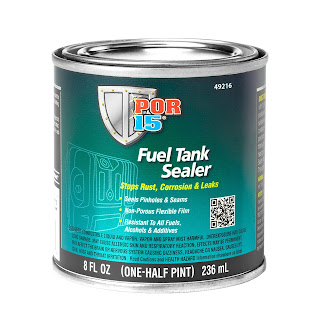The Ultimate Guide to Fuel Tank Sealers: Preserving Your Vehicle's Vital Component
Introduction:
Fuel tanks are the lifeblood of any vehicle, ensuring a steady supply of fuel to keep the engine running smoothly. Over time, these tanks can develop leaks or corrosion, jeopardizing both the vehicle's performance and safety. Fortunately, fuel tank sealers offer a reliable solution to these issues, providing a protective barrier that extends the life of your tank and prevents costly repairs. In this comprehensive guide, we'll delve into the world of fuel tank sealers, exploring their benefits, application methods, and top products on the market.
Understanding Fuel Tank Sealers:
Fuel tank sealers are specially formulated coatings designed to repair and prevent leaks in automotive fuel tanks. They work by creating a durable barrier that seals small cracks, holes, or porous areas, effectively preventing fuel from escaping and inhibiting corrosion. These sealers come in various forms, including epoxy-based, polymer-based, and rubberized coatings, each offering unique benefits depending on the application requirements and tank material.
Benefits of Using Fuel Tank Sealers:
Leak Prevention: The primary benefit of fuel tank sealers is their ability to prevent leaks, ensuring that fuel remains contained within the tank and doesn't pose a risk of leakage onto the road or engine components.
Corrosion Protection: Fuel tanks are susceptible to corrosion, especially in vehicles exposed to harsh environmental conditions or corrosive substances. Fuel tank sealers create a protective barrier that shields the tank from rust and corrosion, prolonging its lifespan and maintaining fuel quality.
Cost-Effective Solution: Repairing or replacing a damaged fuel tank can be costly and time-consuming. Fuel tank sealers offer a cost-effective alternative, allowing vehicle owners to repair minor leaks and corrosion issues without the need for expensive repairs or replacements.
Easy Application: Most fuel tank sealers are designed for easy application, requiring minimal preparation and tools. Whether applied as a liquid coating or injected into the tank, sealers offer a hassle-free solution for DIY enthusiasts and professional mechanics alike.
Versatility: Fuel tank sealers can be used in a wide range of vehicles, including cars, motorcycles, boats, and even industrial equipment. They are compatible with various fuel types, including gasoline, diesel, and ethanol blends, making them a versatile solution for diverse applications.
Application Methods:
Applying a fuel tank sealer requires careful preparation and adherence to manufacturer instructions. While specific application methods may vary depending on the product, the following steps provide a general overview of the process:
Preparation: Begin by draining the fuel tank and removing any remaining fuel, debris, or rust. Thoroughly clean the interior of the tank using a suitable solvent or degreaser to remove dirt and contaminants.
Surface Preparation: Roughen the interior surface of the tank using abrasive materials such as sandpaper or wire brushes. This helps improve adhesion and ensures proper bonding of the sealer to the tank surface.
Application: Follow the manufacturer's instructions for mixing and applying the sealer. Some sealers come in liquid form and can be applied using a brush, roller, or spray gun, while others may require injection into the tank through a designated port or opening.
Drying and Curing: Allow the sealer to dry and cure according to the recommended curing time provided by the manufacturer. This typically involves letting the tank sit undisturbed for a specified period to ensure proper bonding and sealing.
Testing: After the sealer has fully cured, perform a leak test to ensure that the tank is properly sealed and free of any leaks. This may involve pressurizing the tank with air or filling it with water and checking for any signs of leakage.
Top Fuel Tank Sealers on the Market:
POR-15 Fuel Tank Sealer: Known for its excellent adhesion and durability, POR-15 Fuel Tank Sealer is a popular choice among automotive enthusiasts. It forms a tough, flexible barrier that resists fuel, alcohol, and other chemicals, ensuring long-lasting protection for your tank.
KBS Coatings Gold Standard Tank Sealer: This premium sealer offers superior resistance to ethanol fuels and corrosive substances, making it ideal for modern vehicles equipped with ethanol-blended fuels. It provides a permanent seal that prevents leaks and inhibits rust formation Bedliner.
Conclusion:
Fuel tank sealers offer a reliable solution for repairing and preventing leaks in automotive fuel tanks, protecting them from corrosion and extending their lifespan. Whether you're restoring a classic car or maintaining your daily driver, investing in a high-quality fuel tank sealer can save you time, money, and hassle in the long run. By following proper application techniques and choosing the right product for your needs, you can ensure that your vehicle's fuel system remains in top condition for years to come.




Comments
Post a Comment